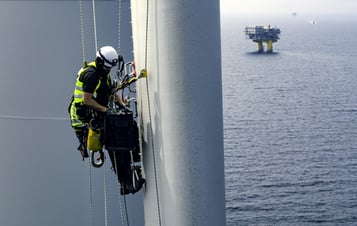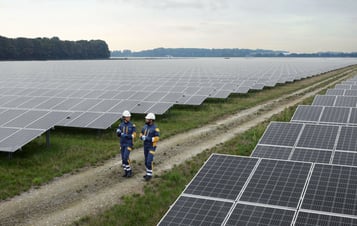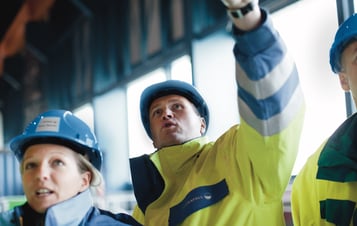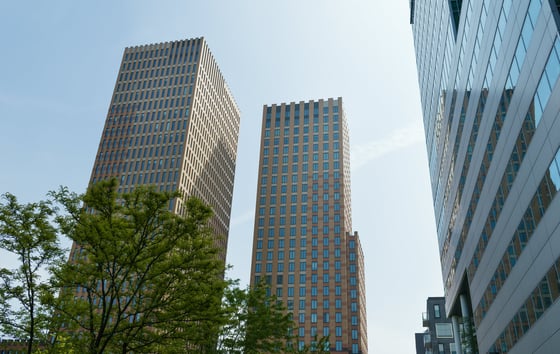Human rights
We acknowledge that we have a responsibility to respect all internationally recognised human rights and that we are in a position to make a positive impact on human rights issues. At Vattenfall, we have the responsibility to identify, prevent, mitigate and remedy potential and actual negative impacts on human rights, throughout our whole value chain.
Our commitment
We base our work on the United Nations Global Compact (UNGC), the International Labour Organization’s (ILO) core conventions, the OECD guidelines for Multinational Enterprises, the UN Guiding Principles for Business and Human Rights and the International Bill of Human Rights. Our commitment to respecting human rights is explicitly stated in our Code of Conduct and Integrity, Code of Conduct for Suppliers and Partners, Statement on slavery and human trafficking (in accordance with the UK Modern Slavery Act), and our Human Rights Policy.
How we work with human rights
As stated in our Human Rights Policy, our commitment to respect human rights is valid for all stakeholders, including employees. This means that we expect employees to act in accordance with the policy to respect human rights and strive to make a positive impact when possible. Our human rights policy was developed following UNGP guidelines, a review of best practices, and multiple rounds of consultation with internal and external experts, and it forms the basis of our human rights efforts. The policy is updated on a yearly basis, approved by the Board of Directors and underpins our work to further increase awareness of human rights.
In practice, the responsibility for driving human rights and sustainability performance and improvement initiatives, as well as complying with relevant policies and legislation, lies within each business area and staff function. The Corporate Sustainability team acts as a support function and centre of expertise towards the whole group and can provide insights, guidance on prioritization and direction, and other forms of capacity building on sustainability issues, including on human rights. Human rights issues are discussed on an annual basis by the Board of Directors and Executive Group Management, and Vattenfall’s CEO together with the Executive Group Management has the overall accountability for human rights within Vattenfall.

Vattenfall policies and key documents
- Human rights policy (PDF 635 kB)
- Human rights action plan (PDF 2 MB)
- Human rights assessment & gap analysis (PDF 2 MB)
- Human rights progress report 2024 (PDF 2 MB)
- Code of conduct and integrity (PDF 687 kB)
- Code of conduct for suppliers and partners (PDF 522 kB)
- Guide to code of conduct for suppliers and partners (PDF 5 MB)
- Statement on slavery and human trafficking (PDF 670 kB)
- Privacy policy
- Whistleblowing policy
Key risks
We systematically identify, assess, and manage human rights risks and impacts through due diligence processes which cover our own operations as well as sourcing and purchasing.
As part of this commitment, in 2021 we engaged a third-party to conduct a large-scale human rights assessment throughout our value chain. Please see the document Human rights assessment & gap analysis above.
The assessment provided an updated overview of where Vattenfall potentially has adverse human rights impacts. The assessment showed that our most salient risks are related to:
Community engagement, livelihoods, and cultural heritage
Due to the nature of Vattenfall’s operations, our activities could impact the communities in which we operate. Every business area is well aware of this risk and carries out local consultation processes with affected communities to understand their priorities and concerns before a project is initiated. This means that landowners, representatives of the local community and the immediate environment, and the neighbours are explicitly consulted through various process consultations and informed by establishing transparent and clear communication channels according to the needs of the local stakeholders. We also recognise that each location and project is unique, and thus our local engagement approach is designed to be flexible to suit each situation and context. We also provide project-specific feedback channels where the local stakeholders can express their concerns.
For a few examples of our work with community engagement, livelihoods and cultural heritage, please see whitepaper on stakeholder engagement in the Netherlands (Dutch only), information about community investment in the UK, and general info on our stakeholders and how we engage them.
Whitepaper on stakeholder engagement in the Netherlands (in Dutch)
Environmental impacts
A safe, clean, healthy and sustainable environment is imperative not only to sustain the planet, but also for people to enjoy their human rights, such as the right to life, health, food, water and sanitation. We are aware that, if not managed properly, Vattenfall could have adverse impacts on the environment. Therefore, we have a strong and responsible environmental culture, with high emphasis on environmental management on all levels of the company and certified management systems in place. In accordance with our environmental policy, we commit to become climate neutral, to protect nature and biodiversity and to use resources sustainably. This means for example to secure responsible water management in water scarce areas, managing the effects of a changing climate through both climate mitigation as well as climate adaptation, and protecting delicate ecosystems and rare species.
To read more about how we prevent environmental impacts, see Our environmental responsibility.
Grievance mechanisms and access to remedy
In order to provide access to remedy in cases where we may have caused or contributed to adverse impacts, we have a web-based Whistleblowing channel available in 11 languages, 24/7, 365 days a year.
We encourage any stakeholder - including but not limited to employees, suppliers, and contractors - affected by our business to report concerns or irregularities caused or linked to our activities, with the option to remain anonymous.
To learn more about our Whistleblowing channel and how reported issues are handled, see our Whistleblowing page.
Human Rights Defenders
Vattenfall does not currently have operations in countries which are considered high risk for human rights defenders. However, we are aware that certain products we source could be coming from or processed through high-risk areas. Vattenfall recognizes that human rights defenders are important partners in identifying risks in our value chain and we have updated our Code of conduct for suppliers and partners to include a statement that we expect our suppliers and partners not to be involved in any activities that seek to undermine civil society and civic freedoms.
Indigenous people
Sweden is the home to the Sámi, an indigenous people in the northern parts of Sweden, Norway, Finland and parts of Russia. Indigenous peoples hold certain additional rights according to international human rights principles, including an express right to be heard. Vattenfall recognizes that our activities could impact indigenous peoples located in the areas in which we operate. To minimize the risk of negative impact on the indigenous peoples, including on reindeer husbandry, we have clearly defined stakeholder engagement processes, as well as best practice guidelines to respect indigenous peoples’ rights, which all employees are expected to follow. We encourage indigenous peoples to take direct contact with us in case of perceived improprieties, and they have access to our Whistleblowing channel as well.
Approach towards indigenous people in Sweden (PDF 350 kB)
Just transition and responsible decommissioning
Just transition is, in essence, the concept of leaving no one behind during the transition to a decarbonised society. Vattenfall’s ambition to enable fossil freedom that drives society forward, and the steps we will take to achieve this, make just transition highly relevant for Vattenfall, as the path to a fossil-free society will inevitably have impacts on both society and individuals, affecting local communities, consumers, and employees throughout the value chain.
It is important to acknowledge that these impacts will require trade-offs, and in some cases it will not be possible to resolve the trade-offs favourably for all involved stakeholders. This is why keeping people at the centre of the transition is so important, as it will help us continue to identify and understand these trade-offs, and thereby to engage with the affected stakeholders to try to minimise the negatives and maximise the positives to the extent possible.
For more information, read about Vattenfall’s ambitions towards Just transition.
Occupational Health and safety
World class Health and safety is a strategic priority for us. The ambition is to never compromise and to have a strong culture of care for everyone working at, and for, Vattenfall. Health and safety is managed in a systematic and proactive manner according to the principles of ISO 45001. Our goal is zero accidents, injuries or work-related ill-health, and we do not tolerate harassment of any kind.
Many of our operations are dangerous by nature, but accidents, incidents, injuries and work-related illnesses are preventable. Focus is therefore on best praxis sharing and active hazard reporting to detect and mitigate serious hazards and risks before they result in incidents.
When incidents occur, they are followed up with Root Cause Analysis, continuous assessment, risks identification and training. Safe operating procedures are developed and implemented accordingly, as well as preventive and corrective actions.
Sourcing from conflict-affected or high-risk areas
Vattenfall operations are not located in conflict-affected or high-risk countries. However, there is a potential risk that sourcing of minerals and fuels from conflict affected and high-risk areas can happen in the supply chain. In order to mitigate this risk, our Code of conduct for suppliers and partners includes additional requirements for suppliers and partners to assess whether their own supply chains source from conflict-affected or other high-risk areas and to adopt enhanced due diligence measures suited to the specific context. We have a risk evaluation methodology in place to identify social and environmental impact of mineral extraction for critical supply chains (for example wind turbines, e-mobility, batteries, solar panels) and assess the need for subsequent action plans. Further, we are actively engaged in industry groups such as Wind Europe and Solar Power Europe to collaborate and find ways forward to jointly tackle supply chain challenges. We are also a founding and active member of Bettercoal where we have driven supplier engagement particularly in Colombia and Russia for many years.
For more information, see our supply chain responsibility.
Supplier and contractor labour conditions
Vattenfall strongly believes that our commitment to human rights extends well past our own company boundaries. Since our operations impact workers throughout our supply chain, it is our responsibility to ensure that their labour rights are respected. Our aim is that the labour conditions at supplier and contractor sites are fair and just. This includes for instance securing appropriate working hours, fair wages, and safe working conditions. We are aware that the labour conditions and challenges differ between countries, and that there is a risk that our operations are linked to challenging labour conditions due to the nature of our sector. We therefore have comprehensive management systems and operational tools in place to assess, monitor, and implement good practices in our supply chain. If questionable labour conditions are suspected or identified, we have an auditing and corrective action plan process in place to mitigate the negative impact this may have on workers. We encourage our suppliers and contractors to make continuous improvements to the labour conditions in their own operations.
For more information, see our supply chain responsibility.
Expectations on our suppliers and partners
We strive to work with others who are committed to doing business in an ethically sound manner. Our Code of conduct for suppliers and partners (Code) defines Vattenfall’s requirements and expectations for suppliers and partners with respect to sustainability. We decided to expand the scope of the Code to partners as we strive to take deeper responsibility and drive positive change across the value chain. The Code is based on, amongst others, the UN Global Compact, the UN Guiding Principles, and the OECD Guidelines, and is guided by the UN Sustainable Development Goals.
The Code explicitly addresses modern slavery and human trafficking. Part of the Code includes specific clauses regarding community engagement and development, child labour and young workers, modern slavery and forced labour, working hours, wages, leave and benefits, health and safety, freedom of association and collective bargaining, equality and non-discrimination, protection of third-party rights, and information security.
We require that our suppliers respect the rights of indigenous and tribal peoples and their social, cultural, environmental and economic interests, including their connection with lands and other natural resources.
Working with human rights is an ongoing process
Our aim is to continuously improve our ability to identify, assess and manage human rights risks. This is an ongoing journey and will be driven not least by raising the awareness of human rights related issues among our employees, suppliers and other stakeholders.
We stay vigilant to be able to respond to new impacts/risks stemming from changes to our geographic presence, our business activities or products, or our business relationships. We aim to follow up and track the performance of our actions to mitigate negative impacts.
Future focus on human rights
Vattenfall will place additional focus on addressing the salient risks, particularly where we have identified the greatest opportunities to strengthen how we manage these risks. We will also continue to initiate projects to further assess risks and impacts on human rights. These include working with a number of external stakeholders in prioritised areas, in particular sourcing from high-risk countries, countries from which we source significant volumes of fuel or key goods, or countries in which local stakeholders have raised issues for further investigation. We will focus on further integrating all aspects of human rights into our processes and in our evaluation of suppliers and contractors.
Related content

Health and Safety is a key component in running a sustainable business.

Our transformation should benefit society, local communities, and biodiversity.

We engage with our stakeholders to understand their concerns and expectations on us.




